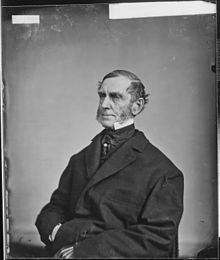Henry Stanbery
| Henry Stanbery | |
|---|---|
 |
|
| 28th United States Attorney General | |
|
In office July 23, 1866 – July 16, 1868 |
|
| President | Andrew Johnson |
| Preceded by | James Speed |
| Succeeded by | William Evarts |
| 1st Attorney General of Ohio | |
|
In office February 1846 – May 1851 |
|
| Governor |
Mordecai Bartley William Bebb Seabury Ford Reuben Wood |
| Preceded by | Position established |
| Succeeded by | Joseph McCormick |
| Personal details | |
| Born |
February 20, 1803 New York City, New York, U.S. |
| Died | June 26, 1881 (aged 78) New York City, New York, U.S. |
| Political party |
Whig (Before 1854) Republican (1854–1881) |
| Spouse(s) | Frances Beecher Cecelia Bond |
| Children | 5 |
| Education | Washington and Jefferson College (BA) |
| Signature | |
Henry Stanbery (February 20, 1803 – June 26, 1881) was an American lawyer and United States Attorney General.
Born in New York, he was the son of Jonas Stanbery, a physician. The family moved to Zanesville, Ohio, in 1814. Henry Stanbery graduated from Washington College in Washington, Pennsylvania (now Washington and Jefferson College near Pittsburgh) and studied law. He was a member of the Union Literary Society at Washington College. He was admitted to the bar in Ohio in 1824 and to the bar of the Supreme Court of the United States in 1832. In 1824, at the invitation of Thomas Ewing, he began practice in Fairfield County, Ohio, and rode the circuit with him. He remained for many years at Lancaster.
In 1846 he was elected the first attorney general of Ohio by the Ohio General Assembly. He accordingly moved to Columbus, where he resided for about five years. In 1850 he was elected a delegate to the convention that framed the state constitution. In 1853 he moved to Cincinnati, and in 1857 he moved across the river to Fort Thomas, Kentucky.
President Andrew Johnson appointed Stanbery Attorney General of the United States in 1866. He resigned on March 12, 1868, to defend Johnson during his impeachment trial. His health at the time was so delicate that most of his arguments were submitted in writing. At the conclusion of the trial, Johnson renominated him as Attorney General and also to the Supreme Court, but the Senate would not confirm him.
...
Wikipedia
